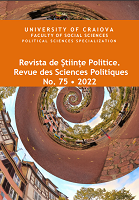Electing the Mayors in Romania’s Big Cities in 2020: Voter Turnout, Legislative Changes, and the COVID-19 Pandemic
Electing the Mayors in Romania’s Big Cities in 2020: Voter Turnout, Legislative Changes, and the COVID-19 Pandemic
Author(s): Mihaela IvănescuSubject(s): Governance, Government/Political systems, Electoral systems, Politics and society, Health and medicine and law
Published by: Editura Universitaria Craiova
Keywords: local elections; turnout; mayor; electoral laws; COVID-19 pandemic;
Summary/Abstract: Local elections have been theorized by many scholars as lower rank or second-order national elections: they are less important, less relevant, and just not as interesting as national elections. In Romania, turnout in local elections was, until the mid-2000s, quite high, even if lower than in parliamentary elections. Since 2008, however, turnout in local elections has been consistently higher than in parliamentary elections. The electoral reform that started in 2011 had, over time, a negative influence on the electoral process in the local elections. In this paper, we argue that the transition from the election of mayors using a majority electoral system in two rounds to a single round has contributed to the decline of citizens’ interest in local elections, exerting a detrimental influence on the quality of political representation in general. Despite the arguments used by many of the supporters of this electoral reform, that electing the mayors in just one round will generate an increase in turnout because the competition will be fiercer, the effect was the opposite. The year 2020 marked a historic low in terms of turnout in local elections in Romania. Analyzing the official electoral data at county level and for each county capital, we will show that the health crisis generated by the COVID-19 pandemic had a minor influence on voting turnout. Instead, the specifics of the electoral law meant that, in the vast majority of county capitals, the turnout was significantly lower that the county average and the mayor was elected without reaching 50% of the votes (in many cases, the winning candidate failed to obtain more than 30% of the valid votes cast), which poses a major problem regarding the representativeness of elected mayors, as well as the stability and political balance within local political institutions.
Journal: Revista de Științe Politice. Revue des Sciences Politiques
- Issue Year: 2022
- Issue No: 75
- Page Range: 49-61
- Page Count: 13
- Language: English

